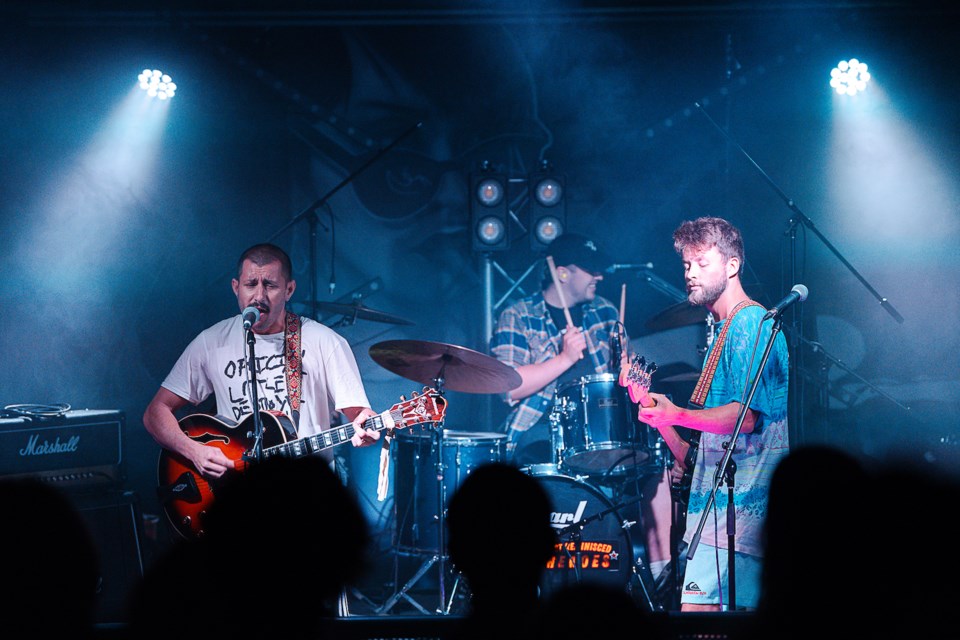After five Wednesdays of showcasing myriad up-and-coming talent, the latest Whistler Music Search (WMS) has its victor.
Shoulder Pains, a brand-new punk rock band consisting of vocalist Christopher Durbin, bassist Charles Stenner, and Tom Scrimshaw on drums, took home the grand prize of $1,000 and a series of winter gig opportunities courtesy of Coors Original and the Crystal Lounge. Durbin and company walked an underdog’s road in the November competition: despite finishing second in their preliminary round, they impressed the judges enough to advance as a wildcard pick.
They proceeded to win it all.
“The recognition is good,” says Durbin. “Maybe people are interested in some alternative music in town, and I think that’s the most exciting thing for me.”
Duo Sam and Charlie earned second place and took home a new Takamine guitar, while third-place entrants TBA received a Volt audio interface.
Meanwhile, Henry Dobell earned the Dave Morris Originality Award. Named after the late Morris, an active and beloved local performer who passed away years ago, the Originality Award continues to be viewed as an honour in Whistler music circles.
Taking the challenge
Longtime Sea to Sky musician Rachel Lewis, who had the privilege of hosting last November’s WMS, was privy to judging deliberations throughout the event. She remembers the judges being intrigued by Shoulder Pains’ style and stage presence, acknowledging their potential yet wanting to see more. In particular, they wanted Durbin to get out of his vocal comfort zone—the so-called “shout singing” many punk rockers are known for.
Durbin credited Erik Van Meerbergen, a.k.a. Big Love, and Brancho Relaxo as the judges who spoke well of him and his crew. In return, they put every bit of feedback into action for their final performance. In just a few days, they came up with a flamenco punk song and a jazz punk offering to prove their versatility.
Colour Lewis impressed.
“Chris sang more, they did more original tunes and their stage presence was even better than on the first night that they performed. Overall, the judges were impressed by their cohesiveness as a band and Chris’s ability to step out of his comfort zone,” she remarks. “He took the challenge and ran with it. [Shoulder Pains] obviously brought a bunch of people as well to cheer them on, which really contributed to the fun vibe of the whole competition.
“Crowd appeal was one of the things on the judges’ scorecards, so they got lots of points there.”
Durbin, for his part, appreciates the opportunity to become more acquainted with other players in the Sea to Sky.
“It was interesting to see what else was out there. What the other bands are like, what the other solo artists are like—to see where we maybe stood out from the other people in town,” he says. “There were some great competitors. A girl called Grace did this solo electric guitar and vocals gig, and I thought she was really great.”
‘Out of the woodwork’
The WMS has been a staple of our performing arts landscape for years, and it remains as popular as ever. Loads of applications stream in every year—enough to fill two whole months if desired. Organizers like Monty Biggins are inevitably forced to turn people away due to time and booking constraints.
Biggins wasn’t able to attend this year’s music search due to a scheduling conflict with his open mic nights at RMU Whistler, but was active in the background fielding applications, running stage setup and spearheading promotional efforts.
“My offering is simply how amazing it is to see 18 local Sea to Sky acts come out of the woodwork to perform,” Biggins says. “We seem to be getting less and less opportunity from venues to share our music, yet the number of creative people doing music is abundant.
“It’s amazing that the Crystal Lounge and a couple other local venues—RMU, Alpine Cafe—continue to focus on the grassroots local offerings while so many other venues have turned to DJs or outsourced to booking entities and acts from outside of the Sea to Sky area.”
As a former WMS winner herself, Lewis knows first-hand how much of a jump-start it can be to an aspiring artist’s career. She remains very involved with the local music scene, even giving private voice lessons to those like Durbin and Dobell.
“Since COVID, I’ve been completely out of the loop about who is here, who’s playing and who’s saying what,” Lewis admits. “I’ve got two young kids, so I don’t go out to the Crystal Lounge anymore for jam night or anything like that.
“The music search was a great opportunity for me to be able to see who’s in town. I didn’t recognize anybody that played in the competition, but I’m getting to know a few of the contestants.”
Durbin, Stenner and Scrimshaw didn’t necessarily intend to band together from the start. They became acquainted by chance during open mic nights at the Crystal Lounge and bonded over Australian punk rock. Musically, Durbin likens Shoulder Pains to other Aussie groups like The Chats and Amyl and the Sniffers: bands who tend to emphasize storytelling and humour as much as melodic prowess.




